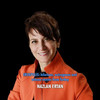Is the loanword mightier than the sword?
At a culture award ceremony last week, President Recep Tayyip Erdoğan lamented on the loanwords in the Turkish language. His lingual peeves, however, are more targeted toward the European words than those from the east, in somewhat of a caricature of his foreign policy.
Should President Recep Tayyip Erdoğan ever decide to promenade in my downtown Izmir neighborhood, he would be outraged. Beer World, Marilen Atelier Patisserie, Jocelyn Patisserie, Gallery Hair Art and Swift Slim Gym stand on the streets known for their mulberry or rose trees, in mockery of the president’s three-year-long efforts to wipe foreign names out of signboards.
English or French brand names or Western loanwords in the daily language often raise the wrath of the president. In fact, Erdoğan’s lamentations on the presence of “foreign influences” that corrupt the Turkish language are almost as regular as clockwork, chiming on Turkish language days in May and September, cultural ceremonies and events of the Turkish Language Institute, the official regulator of the Turkish language since 1932.
Therefore, it came as no surprise when, last week, the president aired his linguistic woes while he gave out cultural awards of the year. Our language, he said, is now sandwiched between the social media-speak and the so-called “Plaza-speak” (the English-inspired corporate language where people who work in business towers use English words - such as “launch” or “forward” or “team meeting” while they converse in their native tongue. “This is neither Turkish nor English, it is ridiculous,” he said, asking the cultural icons he awarded to “protect the Turkish language.”
The president is far from being the only one in wanting an end to the bastardized “Turnglish” of the corporate world. For the last 10 years, one of Turkey’s largest corporations, Eczacıbaşı Holding, has been battling against “the made-up language of business towers.” The Company CEO Bülent Eczacıbaşı has gone as far as fining members of the team for using an English term (such as “colleague”) in their daily speech when there is a perfectly good Turkish equivalent or sponsoring comedies where chic white-collar employees in towers - or the blue-collar workers in the very same towards who try to pass for white-collar - are mocked when they (mis)pronounce the corporate speak. So, yes, the president’s criticism toward this language and what he terms “a bunch of letters that replace words in social media” are probably heartily shared by people who would not usually agree with him on the time of day.
But the difficulty lies in what the president and his cronies see as loanwords in the Turkish language. As far as Erdoğan is concerned, “acquis” [a French term that is used for a body of common rights and obligations that are binding on all European Union countries] is a foreign word, but “müktesebat,” which is a plural Arabic word that refers to “knowledge acquired” is not. When Turks discussing “meeting the acquis,” they refer to the European Union “müktesebat” which sounds, in the mouth of young Turkish bureaucrats, every bit as “foreign” as acquis. The choice of the word, of course, does not lie with the present ruling party - it was in use since the 1990s, but it is a choice the president obviously approves.
As one would expect, the President’s speech at the award ceremony also pointed an accusing finger at the “massacre of the Turkish language” carried out in the early years of the Turkish republic. “Turkish was subjected to the biggest word massacre in our history, [under the guise of] simplifying the language,” Erdoğan said, adding that “words that we have been using for centuries” had been removed from the language. The reference here is to Kemal Atatürk’s “language revolution,” which the founder of modern Turkey considered one of the building blocks of the nascent nation and its Westernization. He first replaced the Arabic letters with the Latin alphabet, then went on to weed out the Persian and Arabic words, replacing them with words that were supposedly from Turkic languages. Occasionally, Atatürk himself took the pen and invented new words and suffixes, with plenty of t’s and ç’s, to replace what he called the dressy Arabic words in the language – a choice that Erdoğan disapproves.
The efforts to get the people of the young republic to speak a “pure” Turkish have not all been fun and games. In the 1920s, a group of nationalist students, supported by the government, started the infamous “Vatandaş Türkçe Konuş” (Citizen, Speak Turkish) campaign which targeted the Greeks, Jews and the Armenians and intimidated them against conversing in their mother-tongues in public, let alone give their non-Turkish names to their shops. In that sense, some of the non-Turkish names on the signboards of downtown Izmir, where the members of Jewish or Levantine minorities have their shops, patisseries and restaurants, are a proud display of their names or those of their grandparents.
Others, of course, are pure affectation - such as the dodgy linguistic creations such as the use of “Hairport” in barbershops, or funny translation on family names to English, hoping it would upgrade the shop. I have been laughing out loud for years at a bakery called “True Rose” - which is the literal translation of its owner’s surname, Özgül.
In August this year, the Turkish Language Institute has suggested new legislation to impose tighter controls on foreign brands in hospitals, malls and shops. Similar proposals have been on and off the agenda for years, without the number of foreign names decreasing. at the height of the president’s war on foreign words in the wake of the 2016 coup attempt, the Turkish Football Federation bowed to the president’s request to change the name of “Vodafone Arena,” a soccer stadium in Istanbul. It was changed to Vodafone “Park” - derived from “parricus” in Medieval Latin and entering Turkish through Old French. Alors, Cher Emmanuel?

